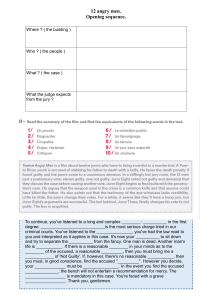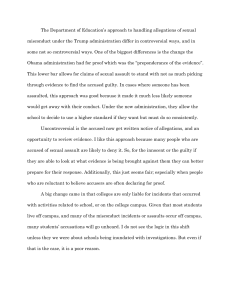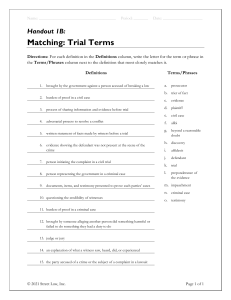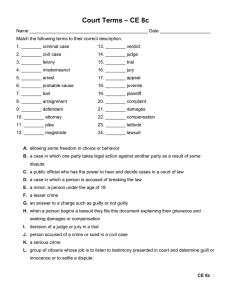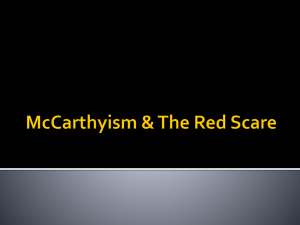119 The People of the Philippines v. Eduardo Labalan Ocimar and Alexander Cortez Mendoza
advertisement
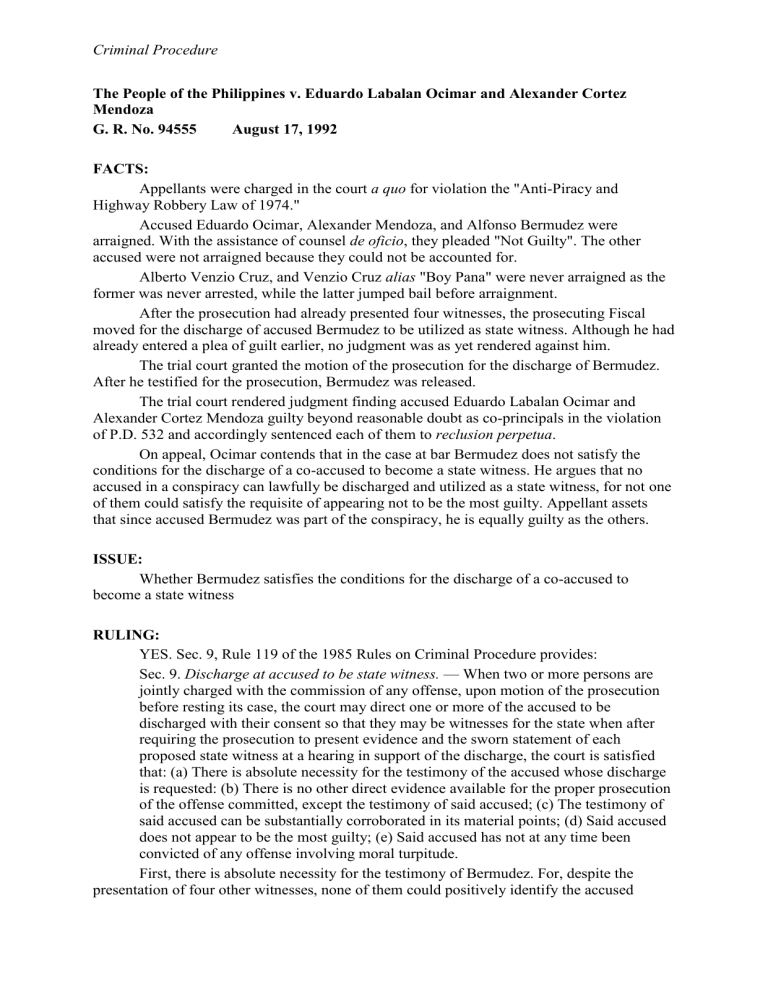
Criminal Procedure The People of the Philippines v. Eduardo Labalan Ocimar and Alexander Cortez Mendoza G. R. No. 94555 August 17, 1992 FACTS: Appellants were charged in the court a quo for violation the "Anti-Piracy and Highway Robbery Law of 1974." Accused Eduardo Ocimar, Alexander Mendoza, and Alfonso Bermudez were arraigned. With the assistance of counsel de oficio, they pleaded "Not Guilty". The other accused were not arraigned because they could not be accounted for. Alberto Venzio Cruz, and Venzio Cruz alias "Boy Pana" were never arraigned as the former was never arrested, while the latter jumped bail before arraignment. After the prosecution had already presented four witnesses, the prosecuting Fiscal moved for the discharge of accused Bermudez to be utilized as state witness. Although he had already entered a plea of guilt earlier, no judgment was as yet rendered against him. The trial court granted the motion of the prosecution for the discharge of Bermudez. After he testified for the prosecution, Bermudez was released. The trial court rendered judgment finding accused Eduardo Labalan Ocimar and Alexander Cortez Mendoza guilty beyond reasonable doubt as co-principals in the violation of P.D. 532 and accordingly sentenced each of them to reclusion perpetua. On appeal, Ocimar contends that in the case at bar Bermudez does not satisfy the conditions for the discharge of a co-accused to become a state witness. He argues that no accused in a conspiracy can lawfully be discharged and utilized as a state witness, for not one of them could satisfy the requisite of appearing not to be the most guilty. Appellant assets that since accused Bermudez was part of the conspiracy, he is equally guilty as the others. ISSUE: Whether Bermudez satisfies the conditions for the discharge of a co-accused to become a state witness RULING: YES. Sec. 9, Rule 119 of the 1985 Rules on Criminal Procedure provides: Sec. 9. Discharge at accused to be state witness. — When two or more persons are jointly charged with the commission of any offense, upon motion of the prosecution before resting its case, the court may direct one or more of the accused to be discharged with their consent so that they may be witnesses for the state when after requiring the prosecution to present evidence and the sworn statement of each proposed state witness at a hearing in support of the discharge, the court is satisfied that: (a) There is absolute necessity for the testimony of the accused whose discharge is requested: (b) There is no other direct evidence available for the proper prosecution of the offense committed, except the testimony of said accused; (c) The testimony of said accused can be substantially corroborated in its material points; (d) Said accused does not appear to be the most guilty; (e) Said accused has not at any time been convicted of any offense involving moral turpitude. First, there is absolute necessity for the testimony of Bermudez. For, despite the presentation of four other witnesses, none of them could positively identify the accused Criminal Procedure except Bermudez who was one of those who pulled the highway heist which resulted not only in the loss of cash, jewelry and other valuables, but even the life of Capt. Cañeba, Jr. It was in fact the testimony of Bermudez that clinched the case for the prosecution. Second, without his testimony, no other direct evidence was available for the prosecution to prove the elements of the crime. Third, his testimony could be, as indeed it was, substantially corroborated in its material points as indicated by the trial court in its well-reasoned decision. Fourth, he does not appear to be the most guilty. As the evidence reveals, he was only invited to a drinking party without having any prior knowledge of the plot to stage a highway robbery. But even assuming that he later became part of the conspiracy, he does not appear to be the most guilty. What the law prohibits is that the most guilty will be set free while his coaccused who are less guilty will be sent to jail. And by "most guilty" we mean the highest degree of culpability in terms of participation in the commission of the offense, and not necessarily the severity of the penalty imposed. While all the accused may be given the same penalty by reason of conspiracy, yet one may be considered least guilty if We take into account his degree of participation in the perpetration of the offense. Fifth, there is no evidence that he has at any time been convicted of any offense involving moral turpitude. Besides, the matter of discharging a co-accused to become state witness is left largely to the discretion of the trial fiscal, subject only to the approval of the court. The reason is obvious. The fiscal should know better than the court, and the defense for that matter, as to who of the accused would best qualify to be discharged to become state witness. The public prosecutor is supposed to know the evidence in his possession ahead of all the rest. He knows whom he needs to establish his case. The rationale for the rule is well explained thus: In the discharge of a co-defendant, the court may reasonably be expected to err. Where such error is committed, it cannot, as a general rule, be cured any more than any other error can be cured which results from an acquittal of a guilty defendant in a criminal action. A trial judge cannot be expected or required to inform himself with absolute certainty at the very outset of the trial as to everything which may be developed in the course of the trial in regard to the guilty participation of the accused in the commission of the crime charged in the complaint. If that were practicable or possible, there would be little need for the formality of a trial. In coming to his conclusions as to the "necessity for the testimony of the accused whose discharge is requested," as to "availability or non- availability of other direct or corroborative evidence," as to which (who) of the accused is the "most guilty" one, and the like, the judge must rely in a large part upon the suggestions and the information furnished by the prosecuting officer . . . .

